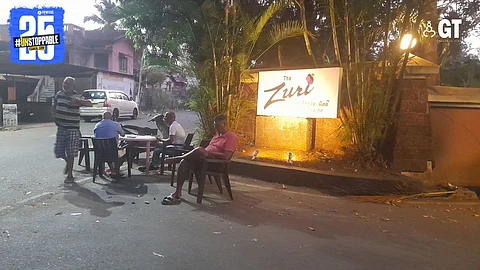A perspective of the taxi issue from a driver’s seat
It is around five in the evening and a taxi swerves past parked vehicles and halts at a beach in South Goa. After scanning the area around for his clients he has come to pick up, George takes a chair at a food cart, orders a cup of tea and begins his story.
George does not own a taxi. He is a driver for a local who runs four taxis. The other three taxis are driven by persons from outside the state. Unlike many cabbies, George does not seem much affected by the turmoil over the government's attempt to introduce the cab aggregator policy.
“I know there is a problem with the government bringing in these aggregators. I have heard they will allow the aggregators to function by using only taxis or vehicles registered in Goa. It cannot be true that only Goan drivers will be used because, even now, locals who have more than one taxi use outsiders,” he says and sips his tea.
One of the claims of the protestors is that by letting in cab aggregators, the government would cut off their livelihood. However, the term livelihood seems misunderstood because then it would fit those with only one cab. What about those who own more than one?
For George, the problem is not aggregators or apps. He feels other cabs should not come and pick up customers from the hotels where they have their stand. “What are we supposed to do if an app-based driver comes and takes our clients? We are left without business and that is what is worrying and the only problem,” he claims.
What are we supposed to do if an app-based driver comes and takes our clients? We are left without business
George, Taxi driver
Taking guests from hotels, says George, is the trouble. He thinks there would be no hassles if the app drivers pick up guests from anywhere else but the hotels which have taxi stands.
Travel agents, however, have a different take and many in the business remember the years of 2003 and 2004 when they had stopped booking rooms in hotels beyond Benaulim because of the manner in which they were being threatened by taxis in places beyond that village.
Travel agents remember the years of 2003 and 2004 when they stopped booking rooms in hotels beyond Benaulim because they were being threatened by taxis in places beyond that village.
“They made life hell for us by insisting that charter tourists needed to use their taxis and not the transport provided by us. They refused to accept how charters operate and it was from then that the problem started and kept boiling with none of the governments interested in finding a solution,” recollects a member of an agency on condition of anonymity.
“Taxi drivers were first instigated by politicians for their votes. The problem started in the South with the local leaders on the coastal belt leaving the drivers on hot air with false hopes,” remembers this agent.
At that time, taxi drivers would allegedly stop buses taking charter tourists on tours or for market trips and even for drops to the airport. “There were times, we feared our guests would miss their flights,” said the agent.
George who is in his early thirties when asked to recollect admits that the tribe of drivers have benefitted over the years but still thinks the government should leave the domain of hotel guests within their grasp.
“I personally will have no problems if our locals get taxis through apps. I do not think that is a problem. It starts when outside taxis come and start taking our clients because our business runs around them,” admits George.
George has a taxi meter in his vehicle but admits it is dusty and not used because guests normally prefer to agree on a flat rate. “Rarely do I get a guest who prefers to go on a trip with the meter on. It is not that we that we do not want to use meters. They are actually more profitable. But in the end, it is the guest’s call,” confides George.
As George finishes his second cup of tea, his customers arrive. He quickly pays his bill and before leaving says, “Both sides need to correct their wrongs.” In many ways, this simple admission by a taxi driver shows where the problem begins.

